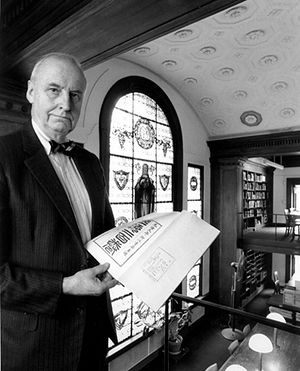Difference between revisions of "William Theodore de Bary"
| Line 28: | Line 28: | ||
Image:debary-1970.jpg | Image:debary-1970.jpg | ||
Image:debary.jpg | Image:debary.jpg | ||
| + | Image:De bary.jpg | ||
Image:debary_1.jpg | Image:debary_1.jpg | ||
Image:debary_10.jpg | Image:debary_10.jpg | ||
Revision as of 09:25, 12 May 2007

William Theodore de Bary (b. 1919) is an East Asian studies expert. He is the John Mitchell Mason Professor, Provost Emeritus of the University, and Special Service Professor in the East Asian Language and Culture Department. A longstanding Columbian, he has played a significant role in the 20th century history of the university.
Education
De Bary is a Columbia alumnus many times over: AB Columbia College '41, MA '48, PhD '53, LittD (Honoris Causa) '94. In addition, he holds honorary degrees from Loyola University of Chicago and St. Lawrence University.
Career
He is a veteran of World War II, in which he served in American military intelligence in the Pacific Theatre. He has edited numerous books of original source material relating to East Asian (primarily Japanese and Chinese) literature, history, and culture, as well as making the case, in his book Nobility and Civility, for the universality of Asian values. He is recognized as essentially creating the field of Neo-Confucian studies.
Additionally, de Bary was active in faculty intervention during the 1968 protests and turned down the Deanship of Columbia College to serve as the university's Provost from 1971 to 1978. He has attempted to reshape the college's Core Curriculum to include "Great Books" classes devoted to non-Western civilizations. De Bary is additionally famous for rarely missing a Columbia Lions football game since he began teaching at the university in 1953. A recognized educator, he won Columbia's Great Teacher Award in 1969, its Lionel Trilling Book Award in 1983 and its Mark Van Doren Award for Great Teaching in 1987.
De Bary refused to accept appointment as a University Professor in 1978, as he did not want it to seem like a backroom deal had been struck. Instead, he accepted the just-created John Mitchell Mason Professor of the University, a post created specifically for former Provosts. He retired in 1990, but still teaches up to five courses per semester on a pro bono basis. Usually these courses include an introduction to major topics in East Asian civilization, an intermediate literature course in Chinese humanities, an intermediate literature course in Japanese humanities, a graduate-level survey of either Chinese or Japanese philosophy (alternating each year), and the Columbia College senior colloquia "Nobility and Civility".
De Bary is rumored to retire after the 2006-2007 academic year. This would mark his 70th year as a Columbian (he entered in 1937), his 54th year on the faculty, and his 17th year of de jure retirement.
Photos
Major Works
- Living Legacies at Columbia (2006)
- Nobility and Civility : Asian Ideals of Leadership and the Common Good (2004)
- Asian Values and Human Rights : A Confucian Communitarian Perspective (1998)
- Confucianism and Human Rights (1998)
- Mahābhārata (translation, 1998)
- Waiting for the Dawn : a Plan for the Prince (translation, 1993)
- Learning for One's Self : Essays on the Individual in Neo-Confucian Thought (1991)
- The Trouble with Confucianism (1991)
- Approaches to the Asian Classics (1990)
- Message of the mind in Neo-Confucianism (1989)
- Neo-Confucian Education : the Formative Stage (1989)
- East Asian Civilizations : a Dialogue in Five Stages (1988)
- The Rise of Neo-Confucianism in Korea (1985)
- The Liberal Tradition in China (1983)
- Yüan thought : Chinese Thought and Religion under the Mongols (1982)
- Neo-Confucian Orthodoxy and the Learning of the Mind-And-Heart (1981)
- Principle and Practicality : Essays in Neo-Confucianism and Practical Learning (1979)
- Unfolding of Neo-Confucianism (1975)
- The Hindu Traditon: Readings in Oriental Thought (1972)
- Self and Society in Ming Thought (1970)
- The Buddhist Tradition in India, China and Japan (1969)
- Approaches to Asian Civilizations (1964)
- Guide to Oriental Classics (1964)
- Sources of Japanese Tradition: Volume 1 (1964)
- Sources of Chinese Tradition: Volume 1 (1960)
- Approaches to the Oriental Classics: Asian Literature and Thought in General Education (1959)
- Sources of Indian Tradition (1957)
(Source: Library of Congress Online Catalog)
External links
- Your Columbians: William Theodore de Bary
- This article is largely based on material from Wikipedia's article on William Theodore de Bary
| Preceded by Polykarp Kusch |
Provost 1971-1978 |
Succeeded by Norman N. Mintz (acting) |





















